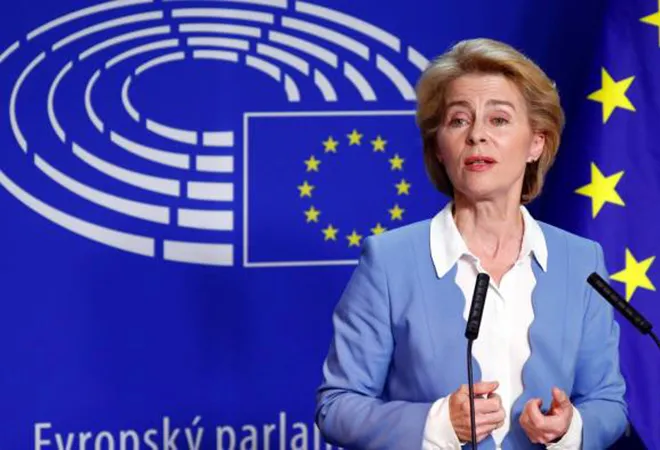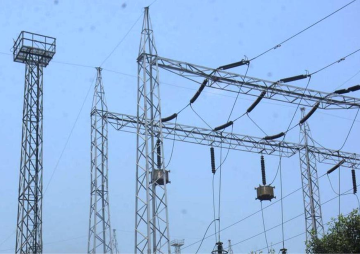
In her first state of the union address to the European Parliament Plenary on 16 September, the President Ursula von der Leyen repeated the now well-known formulation that the EU saw China as a “negotiating partner, an economic competitor and a systemic rival.”
She acknowledged that the two had common interests on issues like climate change and the environment, but said more work was needed on key issues like market access for European companies. And she made it a point to note that the EU believed “in the universal value of democracy and the rights of the individual”. For that reason, she declared that the EU would “call out” on human rights abuses in Hong Kong, or in the case of Uighurs.
From a policy point of view what was more important was her statement that the EU Parliament would come forward with a European Magnitsky Act. The original American statute of 2012 was aimed at Russian officials responsible for the death of the Russian lawyer Sergei Magnitsky in a Moscow prison. If the Europeans follow the American model, the law will target individual offenders, freeze their assets and ban them from entry. The new EU posture is aimed at telling Beijing that while opening Chinese markets is an important EU goal, it would not be at the cost of its well-established concerns for human rights.
The Covid-19 pandemic has accelerated trends, both positive and negative, in reshaping the world order and this is manifesting itself in Europe as well. In the past several months we have seen friction between EU and China on account of the handling of Covid-19 itself, as well as those arising from Chinese actions in Hong Kong and Xinjiang, and these layered upon ongoing unhappiness over the China not providing a level playing field for European companies. Its policies of acquiring European companies, forcing them to part with technology, and denying reciprocity have been rankling on the EU for some time now.
Europe is the destination for China’s Belt and Road Initiative. Its investments and industrial exports have helped China to be the manufacturing powerhouse it is today. Beijing now hopes that besides technology, Europe will provide high-end Chinese goods with a market. But increasingly it appears that Beijing seeks to supplant Europe, rather than complement it in many areas. And European companies are finding it increasingly difficult to do business in China.
There has been some estrangement, too, with the 17+1 grouping of China and Central and East European Countries (CEEC) aimed at providing China a leverage with the EU. Member states are disappointed at the sub-par performance of the Chinese on account of trade and investment. Besides, the US has brought considerable political pressure to bear on the individual states on account of Huawei and 5G.
Rumblings have been heard for the past couple of years. In March 2019, President Macron declared that the “time for European naivete (on China) is over.” He was speaking just before hosting the Paris summit between Xi Jinping and three European leaders— German Chancellor Angela Merkel, the then European Commission President Jean-Claude Juncker and himself.
This year, the relationship has deteriorated under the onslaught of the pandemic, as well as Chinese actions in Hong Kong and Xinjiang. Today, it appears that the end product of the churning could have China as the loser, and the trans-Atlantic relationship getting a fresh boost.
Look at the figures more closely. Trans-Atlantic trade in goods and services totals more than $1.3 trillion, where trade between EU and China stands at $ 718 billion. Further, trade in services between the two regions is growing at a good pace. Then there is the issue of investments. The US and EU are each other’s primary source and destination of FDI which stands at $ 6.2 trillion. US investment in Europe makes up some 60 percent of total stock of US outward investment and European investment in the US makes up 68 percent of the total stock of foreign investment in the US. Chinese investment makes up only 3 percent of the total stock of FDI in EU.
Beijing has been making a conscious effort to improve its ties with EU to offset its problems with the US. However, to go by the recent tour of senior Chinese leaders to the region, the outcome has been less than overwhelming. In the last week of August, Chinese Foreign Minister Wang Yi visited Italy, the Netherlands, Norway, France and Germany.
This was his first post-pandemic visit to the region and took place in the aftermath of a greater European scrutiny of China on account of Hong Kong, Xinjiang and the handling of Covid-19.
Wang may have wanted to give the message that China had successfully overcome the pandemic, its economy had recovered, and that China could play a significant role in Europe’s recovery. But the outcome was not a particularly happy one. Almost all his interlocutors, reacting to the strong public opinion in Europe, raised the issue of Hong Kong and Uighurs. In the middle of this he got into an unseemly quarrel with the Czech Republic when China’s criticism of Czech Senate Speaker Milos Vystrcil’s visit to Taiwan descended to downright abuse.
The European position on China is being articulated with growing frequency. EU’s top foreign policy official Josep Borrell recently criticized China’s growing authoritarian tendencies and its vision of the world order prioritizing economic and social rights over political and civil rights. And, as a subtext as it were, he has also noted the serious imbalances in EU’s relationship with China, especially the lack of market access for European businesses. This is what was repeated by President von Leyen.
A lot of what is happening between China and the EU is a subset of the happenings between Beijing and Berlin. Observers have been pointing out the steady drift in the relationship between China and Germany. This was true of the recent EU-China virtual summit co-hosted by Chancellor Angela Merkel, who currently holds the EU Presidency and whose policy has been to hold China close to Germany. Expectations were that the summit that stood in for the earlier planned Leipzig event, would lay out a roadmap for an accelerated push for the Comprehensive Agreement on Investment (CAI). But that did not happen and indeed, not only was there no CAI, but no agreement on climate change, Covid-19 cooperation or on other German demands for common standards.
The outcome was fairly anodyne, with no special push in any particular direction. Xi’s call for a “comprehensive strategic partnership” at the meeting ran headfirst into the European anger over a variety of human rights abuses by China. The President of the European Council Charles Michel and President of the European Commission von Leyen made it a point to raise issues like Hong Kong and Xinjiang in their remarks.
China has grown from a partner to business rival. This time around, unlike 2008-2009, Germany is not getting the kind of lift it got from Chinese recovery. This is not just because Chinese are not buying, but that Chinese companies have found Chinese made replacements and this is happening in high-end industrial machines like tunnel boring machines, wind turbines, electrical batteries and so on. The Germans are feeling the heat.
China remains an important market for German products and important German companies like Volkswagen and BASF have huge investments there. However Chinese actions have compelled even the accommodative Merkel administration to reset their ties.
In a move that cannot have been particularly comfortable for Beijing, and in the midst of Wang’s tour, Germany issued the policy guidelines for its first Indo-Pacific strategy. The aim of the document, the German government press release said, was to make “an active contribution to shaping of the international order in the Indo-Pacific.” The German definition of the Indo-Pacific, is similar to the Indian one, comprises of the entire Indian and Pacific Oceans. The strategy refers to issues like climate change and marine pollution, but also the need to strengthen the rule of law and human rights.
In a statement accompanying the guidelines, Foreign Minister Heiko Maas said that though the Himalayas and Malacca Straits seemed far away, “our prosperity and our geopolitical influence in the coming decades will depend…on how we work with the countries of the Indo-Pacific region.” Germany wanted to shape the world order that was emerging “so that it is based on rules and international cooperation, not on the law of the strong.”
Neither Germany nor the EU are about to jump into the Quad and align with the US against Beijing. German policy looks more like the one articulated by Japan and South Korea, and even India, notwithstanding our Himalayan contretemps. It essentially complements the French policy which was issued two years ago which emphasizes multipolarity. Germany and France are now working towards a common EU strategy on the Indo-Pacific.
At this juncture, Germany’s positioning is important because as of 1 July, Germany has assumed the EU Council’s six-month rotating presidency, placing it in a position to shape a new EU Indo-Pacific policy. But given the statements coming from EU leaders, as well as the actions of EU states like France and Germany, we can soon see other European nations coalescing around a strong and new EU policy not only on the Indo-Pacific, but China and the US as well.
The views expressed above belong to the author(s). ORF research and analyses now available on Telegram! Click here to access our curated content — blogs, longforms and interviews.




 PREV
PREV


